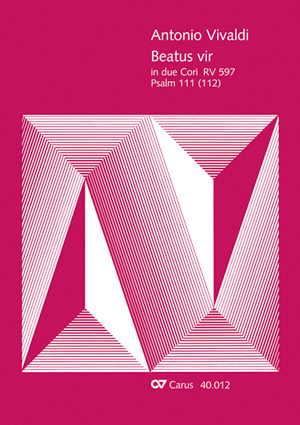
Psalm 111
Psalm 111 RV 597
Contents
-
Composer
Antonio Vivaldi
| 1678-1741
Reviews
Antonio Vivaldi
Der uns allen bekannte „Concerto-Komponist par excellance” Antonio Vivaldi (1678-1741) hat seiner Nachwelt nicht nur Instrumentalwerke hinterlassen, sondern auch eine Vielzahl an Vokalwerken, wovon 50 überliefert sind. Von seinen insgesamt 8 doppelchörigen Vokalkompositionen ragen fünf Psalmvertonungen heraus, u.a. der Psalm 111 „Beatus vir”. Hierbei bezieht sich die Doppelchörigkeit nicht nur auf den Gesang, vielmehr wird mit der Bezeichnung „in due cori” eine Besetzung mit zwei „kompletten” Ensembles mit je eigenen Solisten, eigenem Chor, eigenem Orchester und jeweils separater Continuo-Gruppe angezeigt (einschl. des Einsatzes zweier Orgeln!). Die Ensembles werden teils abwechselnd und teils im Block eingesetzt. Ergänzt durch den punktierten martialen Rhythmus erhält dieses Werk einen „großartig-festlichen” Charakter.
Kirchenmusik im Erzbistum Bamberg, Dez. 1999
Wie schon bei der Discographie erwähnt, gehören die beiden Beatus vir (RV 597, 795) und die beiden Dixit Dominus (RV 594-95) zu den genialsten und glänzendsten Psalmen-Vertonungen von Vivaldi ... Ein hochkarätiges Werk, das diese ausgezeichnete Ausgabe von Carus verdient. Ich freue mich schon auf die nächsten Vivaldi-Publikationen!
Toccata, 7/03
Frequent questions about this work
 There are no questions and answers available so far or you were unable to find an answer to your specific question about this work? Then click here and send your specific questions to our Customer Services!
There are no questions and answers available so far or you were unable to find an answer to your specific question about this work? Then click here and send your specific questions to our Customer Services!





